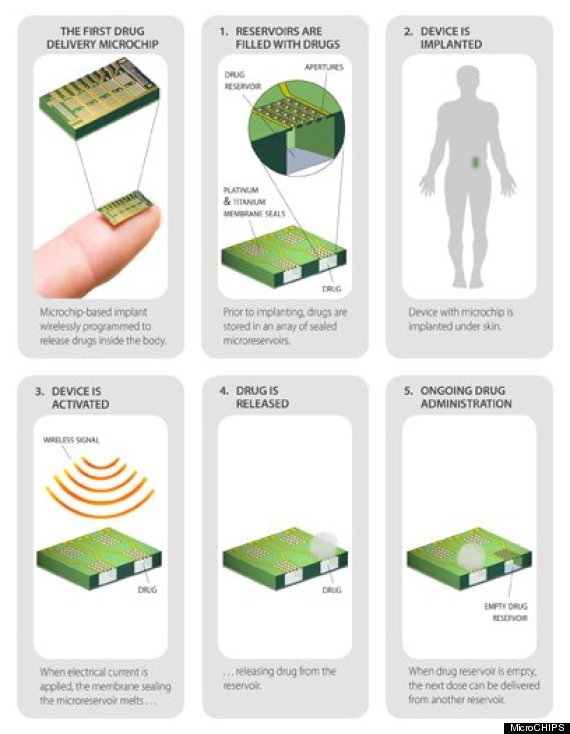Digitizing health—vaccine passports, birth control microchip implants?
Back in October, former Democratic presidential candidate Andrew Yang first cautioned that the world is now undergoing a Fourth Industrial Revolution, and everyone needs to be prepared for how the adoption of cyberphysical systems will significantly change the way people live and work.
This new world is taking computerization a step further to include smart technology such as artificial intelligence, facial ID recognition, 3D printing, genome editing, and digital health-care sensors. In parts of Africa and Asia with prevalence of infectious diseases, poverty and rapid population growth, programs are in place to provide digital ID with vaccines and possible birth control implant with a microchip.
Last September, the ID2020 Alliance that provides digital ID, in collaboration with the vaccine alliance Gavi and the Government of Bangladesh, launched a new program combining biometrics and blockchain to provide digital ID with vaccines.
Both ID2020 and Gavi Alliance are supported by Bill Gates through Microsoft and the Bill & Melinda Gates Foundation, and the program leverages immunization as an opportunity to establish digital identity, which in this case would track who has received vaccination. According to an analysis published by Pew Research Centre last July, Bangladesh places eighth as the most populous country in the world in 2020, yet still suffers from widespread poverty.
Brazil, Bangladesh, Russia, and Mexico are all among the top 10 countries by population today. By 2100, they are projected to be overtaken on this list by the Democratic Republic of the Congo, Ethiopia, Tanzania and Egypt. https://t.co/yWtjZxBNPu pic.twitter.com/9pdiiIZg8H
— Pew Research Center (@pewresearch) July 22, 2019
Surveillance and tracking
The goal of this public-private partnership is to track undocumented individuals in less developed countries missing identification such as official birth registration or medical records, and thus may lack access to healthcare services and vaccines. However, ID2020 is also active in more developed countries such as the US and has partnered with City of Austin, Texas, to provide a blockchain-enabled digital ID platform for the homeless population, as well as to refugees receiving medical treatment from the International Rescue Committee in Thailand.
Now with the sudden onset of the Covid-19 pandemic, this seems to have presented an opportunity to fast track global health into a new era of digital healthcare.
Already there has been discussions about issuing an “immunity passport” to allow individuals a “back to work” pass in order to leave quarantine and engage in commerce again, whether through antibody testing or vaccines. With the increased use of contactless payment, Microsoft in March filed a patent (No. 060606) for a cryptocurrency system linked to body activity data such as brain waves and body heat, moving closer towards a cashless economy in light of the Covid-19 contagion.
Indeed, Congress’s recently proposed TRACE Act (H.R. 6666) to trace and quarantine potential Covid-19 infected persons, if passed, would be further augmented by blockchain-enabled digital ID linked to records of immunization and body-activity enabled cryptocurrency system. H.R.6666 is related to the 2003 Biological, Chemical, and Radiological Weapons Countermeasures Research Act (S. 666) on state response to maintain public safety during bioterror or pandemic emergencies.
As such, novel digital healthcare concepts being tested in developing countries in Asia and Africa is now flowing to industrialized countries due to the pandemic. However, most digital health solutions still flow from developed to developing countries especially for family planning and sustainable population growth.
Sustainable population growth
Again funded by the Bill & Melinda Gates Foundation, another example of this human-machine interface in healthcare is a wireless birth control microchip that can be activated by a remote control, as part of the Foundation’s goal to bring family-planning services and supplies to 120 million women around the world by 2020.

A diagram showing how the wireless implant works (MicroCHIPS). Huffington Post 2017
In 2014 Bill Gates tapped the Massachusetts-based MicroCHIPS—recently acquired by San Diego’s biopharma company Daré Bioscience—to develop an implantable birth control microchip that emits hormones and can be turned on and off for family planning.
Implanted under the skin, the microchip stores a supply of the hormone levonorgestrel in reservoirs hermetically sealed with titanium and platinum on the chip. The seal is melted with an electrical current supplied by the internal battery, which releases 30 micrograms of the hormone per day.
After the drug is released the seal hardens in place again, and the chip is estimated to last up to 16 years. MicroCHIPS still needs to file an application with the Food and Drug Administration, and as with any chips and wireless devices, the technology will need to be heavily encrypted to prevent hackers from accessing the device.
Bill Gates’ support for this technology can be traced back to his 2003 PBS interview with Bill Moyers, wherein he cites the Club of Rome’s warnings on the limits of growth and depletion of the world’s resources, which helped shape his concern over global challenges caused by unsustainable population growth especially in impoverished countries.
Coupled with Andrew Yang’s warning that the Fourth Industrial Revolution could replace workers with machines and also create a large unemployed population, this provides an interesting juxtaposition between two views: Yang’s views of technology as a cause of surplus labor and “overpopulation” in a scarce labor market, while Gates views technology not as a problem, but rather as the solution to help reduce population and surplus labor in global health and global markets.
First published in Asia Times 5/22/20.
Dr. Christina Lin is a US-based foreign policy analyst specializing in China-Mediterranean relations. She has extensive US government experience working on national security issues and was a CBRN research consultant for Jane's Information Group.

No comments:
Post a Comment